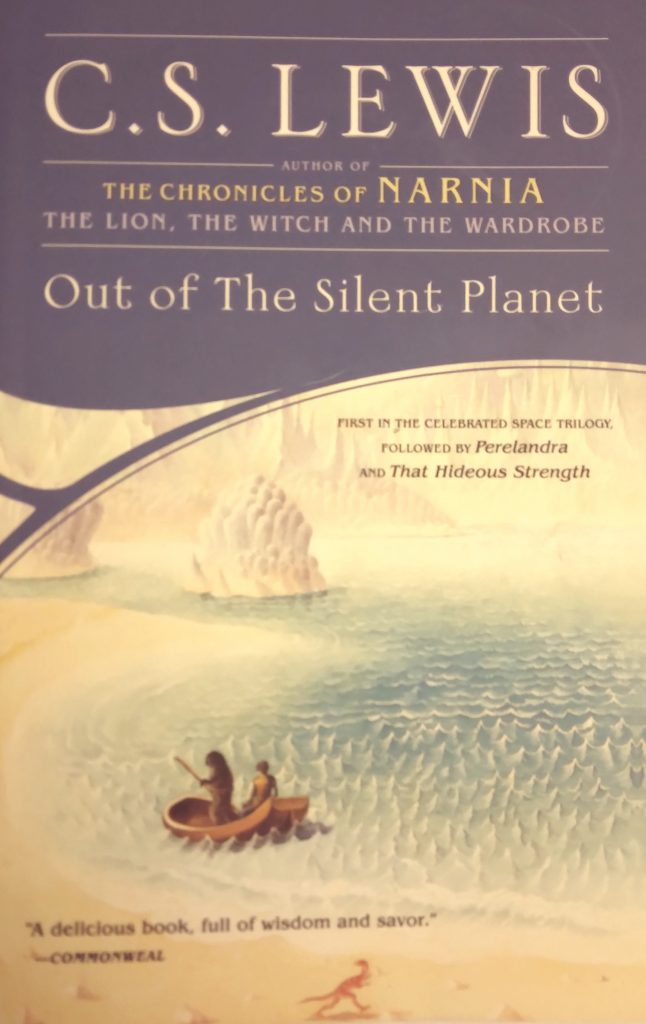By C. S. Lewis

Out of the Silent Planet is the first in C. S. Lewis’ space trilogy. I believe my sister gave me the second, called Perelandra, that she picked up in a used book rack somewhere. Being impatient to read it, I did not wait to find the first, Out of the Silent Planet and the third, That Hideous Strength from a used dealer, I went to the evil overlords at Amazon and ordered them at full price (you’re welcome, Jeff Bezos, I hope you enjoy space.)
I read the Lion, the Witch, and the Wardrobe series as a kid and later as an adult, and I was transported, like the children in the book from a dreary and mundane world, through that wardrobe into a new land that was fantastical and imaginative. In this novel we are transported to another world outside of our mundane Earth, when the main character Dr. Ransom is kidnapped and spirited away on a space traveling Orb. As C. S. Lewis’ only foray into the science fiction genre, it is not hard science fiction.
C. S. Lewis was always more of a philosopher and moralist than a scientist. Following in that vein it is more akin to H.G. Wells in it’s technical naivety, and it does not go in to the specifics of how things work only that they are by some advanced science. During my brief research, I found some suggestions that this could be Lewis’ take on First Men in the Moon. It does not predict the coming of any technologies. But, what Lewis does best is that other vital ingredient of science fiction; he reflects humanity through an alien mirror. He discusses themes of coexistence, colonialism, and divinity as the main character travels across a strange planet inhabited by several different alien cultures. In these ways I found OOTSP to be similar to Ursula K. Leguin’s Left Hand of Darkness.
Dr. Ransom is on a walking tour in the English countryside, where he stops at a house and finds strange things afoot. He is kidnapped by two scoundrels, Dr. Weston a megalomaniac, and Devine a simple opportunist. As the back of the book attests, he is taken to a planet called Malacandra, where they try to offer him up as a sacrifice to the beings that inhabit the planet, whom they erroneously believe to be primitives. Ransom escapes and travels about meeting the peoples of this planet; which turns out to be the one we know as Mars. Malacandra is inhabited by 3 intelligent species that get along in some sort of harmony, while keeping separate roles in society and inhabiting separate habitats amongst the varied landscape. All are bound, and guided by other more ethereal beings called Eldil who seem to keep everything in balance and harmony.
There are other worlds including Venus that are a part of this realm, but earth, called Thulcandra, or ‘the silent planet’ of the books title. The earth was once part of this larger space realm but somewhere in its past, things had gone wrong and the planet had gone silent. We find out that Dr. Weston plans to conquer the planet and others beyond for the glory of the human race and its progeny. The Eldil are powerful and do not understand his logic, and they send the strangers back to earth. Dr. Ransom is given the choice to return, and he does. He relates his story to the author who publishes it as fiction, so that a wider audience can hear the story without ridicule.
In Lewis’ book humans are a very small and inconsequential part of a larger more diverse society and universe. One of the longest running themes of the genre. Lewis is often given the title ‘Christian author.’ This novel can be read as a retelling of Christian mythology, in particular the arch-angels who guide humanity, and the fall from heaven and rebellion of one of their own. This is alluded to by the Eldil, and their discussion of the heretofore, unknown history, of the Silent Planet Earth, and why it is no longer part of the heavenly utopia of solar system planets. He does not name any names, nor lead the reader as an evangelist would though. For this I cannot fault him any more than I would fault Shakespeare for retelling Greek mythologies. Both mythologies are retelling yet older stories.